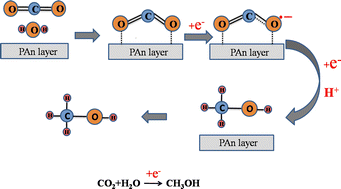Nano-polyaniline enables highly efficient electrocatalytic reduction of CO2 to methanol in supporting electrolyte-free media and the detection of free-radical signals
Abstract
Metals and metal oxides are widely used as catalysts for the electrochemical reduction of CO2. Here, we report a low-cost catalyst based on nano-polyaniline polymerized on graphite for the electrochemical reduction of CO2 in CO2-saturated water free of supporting electrolytes. The nano-polyaniline electrode in this solution shows low resistance and low charge-transfer impedance (Rct), which leads to a rather high reduction current density (−16.8 mA cm−2) and low overpotential (−0.44 V vs. Ag/AgCl). This solution is environment-friendly and mimics that in photosynthesis. The free radical signal of CO2 was successfully detected during the reduction process. The 1H NMR result demonstrates that the only product formed was methanol.

- This article is part of the themed collection: FOCUS: Recent progress on electrocatalytic CO2 reduction


 Please wait while we load your content...
Please wait while we load your content...